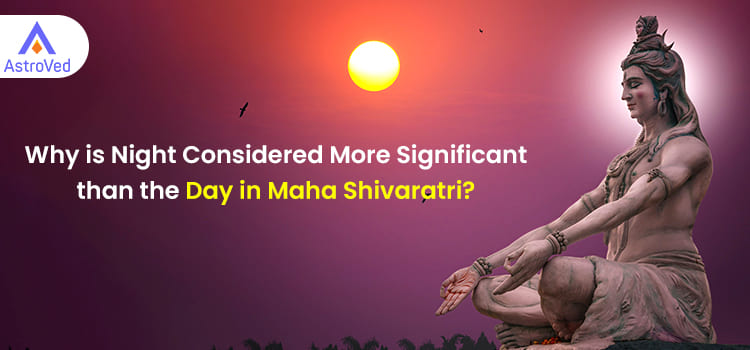Why is Night Considered More Significant than the Day in Maha Shivaratri?
Shivaratri is observed by Hindus from the night of the 13th through the 14th day of every month in the Hindu lunar calendar. During this time, Shiva, the “God of Destruction and Transformation,” is worshipped by people with great devotion.
The Shivaratri that falls during Phalguna month is very significant and is called Maha Shivaratri, meaning the “Great Night of Shiva.” Celebrated in either February or March, as spring approaches, Maha Shivaratri marks new beginnings, especially in spiritual matters.

Significance of Maha Shivaratri
Maha Shivaratri commemorates the cosmic dance of Shiva as Lord Nataraja. Shiva’s dance or Tandava leads to new creation, the beginning of a new cycle in the Universe. It is an ideal time to meditate on how one can let go of the old to create something new.
The festival also commemorates Shiva’s act of swallowing Halahala, a poison that emerged during the churning of the Milky Ocean for Amrit. He drank the poison to save the Universe from destruction. The Bhagavat Purana says that great beings accept voluntary hardship to mitigate the suffering of others. Due to this, people worship him on Maha Shivaratri to eliminate their sufferings and help them achieve their spiritual goals.
It was also on this day that Shiva married Shakti (Goddess Parvati). The divine couple represents the masculine and feminine energies in the Universe and every person. Thus, besides celebrating their divine nuptials, it is also a day to recognize the importance of these energies in our lives.
Maha Shivaratri is celebrated when the full moon day coincides with Magha Nakshatra. People observe fast on this day and stay awake at night. It is a night when one realizes that reality or the material world is just a dream or illusion. This knowledge leads to spiritual awakening. Hence, this night is important to all those who seek a deep connection with the divine and achieve self-realization.
On this night, Shiva appeared as Arunachala, the ultimate light, a formless form. Worshipping him on this night can help one experience oneness (Advaita) with Shiva.
In the Siddha tradition, fasting on Shivratri day and night and keeping vigil throughout the night can heal both physical and mental health issues.
Maha Shivratri is like a New Year for Sadhaks (spiritual aspirants). It is an ideal occasion for spiritual awakening and material attainment. On this night, as the constellations are in good positions, it is very good for undertaking meditation.
Rajas (quality of passionate activity) and Tamas (quality of inertia) afflict human beings in a negative way. Maha Shivaratri fast and meditating on Shiva helps control these Gunas. Meditating restricts movement and subdues emotions like anger, lust, and jealousy caused by Rajas. By keeping vigil during the entire night helps conquer Tamas also.
Also, on this night, there is a great upsurge of energy within the human body. One can channel this energy and connect with the divine by staying awake and keeping the spine erect. For this reason, it is an important day for spiritual seekers.
Ascetics consider Maha Shivaratri to be the day Shiva became one with Mt. Kailas. Shiva is the Adi guru who gave the world the science of Yoga. So, he is also called Adiyogi. He became completely still on this day after having meditated for many millennia. Hence, for ascetics, Maha Shivaratri is the night of stillness.
For most devotees, it is also the night when they can overcome the darkness and ignorance in their lives and become enlightened. This aspect is borne out by the story of the hunter who performed Pooja for Shiva inadvertently while taking refuge in a bel tree at night after getting lost in the jungle. He plucked the bel leaves and dropped them on a Shivlinga near the tree. His tears also fell on the Shivling. As he did not find any prey, he did not eat anything. So, he also observed the fast. Pleased by this, Shiva gave him his blessings. He went to Shiva’s abode after death and was reborn as a king in his next birth.
Hence, devotees believe that keeping vigil on this night and worshipping Shiva can bring many blessings.






